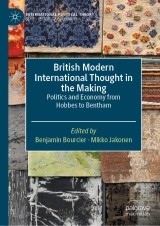Details

British Modern International Thought in the Making
Politics and Economy from Hobbes to BenthamInternational Political Theory
|
96,29 € |
|
| Verlag: | Palgrave Macmillan |
| Format: | |
| Veröffentl.: | 13.02.2024 |
| ISBN/EAN: | 9783031457135 |
| Sprache: | englisch |
Dieses eBook enthält ein Wasserzeichen.
Beschreibungen
<p>This book articulates international political theory in dialogue with economics on several questions. It asks: how has modern international theory been adjusted and nourished by economic ideas, theories and practices? How far has the distinctive contribution of some theorists to international theory been informed by their views on economy? What has been the impact of the theory of the state for economic and international theory? What sort of economic thinking has led to revise the debates constitutive for the modern international realm? How have economic debates been rhetorically connected to political debates in the field of international relations?</p><br><p></p>
Chapter 1: Benjamin Bourcier and Mikko Jakonen: Introduction.- Part I: Early Modern British International Thought.- Chapter 2: Carlos Eduardo Suprinyak: Grotius Among the English Merchants: <i>Mare Liberum</i> and Anglo-Dutch Rivalry in the Early Seventeenth Century.- Chapter 3: Mikko Jakonen: Hobbes and the Problem of International Trade.- Chapter 4: Daniel Layman: Locke’s Conflicted Cosmopolitanism: Individualism and Empire.- Part II: The Scottish School of Political Economy within International Thought.- Chapter 5: Erik W. Matson: “To Keep Industry Alive”: Hume on Freer International Trade as Moral Improvement.- Chapter 6: Edwin van de Haar: Human Nature as the Foundation of Adam Smith’s International Theory.- Chapter 7: Benoît Walraevens: Colonization, Commerce and Global History: Adam Smith and Raynal’s <i>Histoire des Deux Indes.- </i>Chapter 8: Laurie Bréban & Jean Dellemotte: Remote Encounters of a Distant Kind: Natives and Westerners in Adam Smith’s International Thought.-Part III: Bentham’s Political Economy and International Theory.- Chapter 9: Nathalie Sigot: One Conclusion and Two Explanations: Bentham’s Economic Analysis of International Trade.- Chapter 10: Michael Quinn: Bentham via Dumont on the Balance of Trade.- Chapter 11: Benjamin Bourcier: Jeremy Bentham’s Politics of Global Commerce as a Limit-Case.- Chapter 12: Eileen M. Hunt: Women’s Misery and Women’s Rights in International Law and Literature: Wollstonecraft, Malthus, Bentham, and Shelley.
<div><p><b>Benjamin Bourcier</b> is Associate Professor of Philosophy, ESPOL, Catholic University of Lille, France. His main research interests include the history of international political thought, cosmopolitanism, Jeremy Bentham, the enlightenment.</p><p><b>Mikko Jakonen</b> is Professor of Social and Public Policy, University of Eastern Finland. His main research interests are in social policy, work, economy, social theory and history of political thought.<br></p></div>
<p>“For those reared on a diet of Saint Pierre, Rousseau and Kant, it will come as a shock to find that British international thought often pre-empted their ideas or developed them separately, based on a deep understanding of commerce and the global balance of powers.” </p><p> </p><p>—<b>Peter Niesen</b>, Hamburg University</p><p>“Britain’s transformation into an economic powerhouse over the course of the seventeenth and eighteenth centuries was matched by a formidable group of contributors to economic theory and international political thought. This excellent volume canvasses the ideas of over a dozen prominent “economists,” including Hobbes, Locke and Bentham, as well as Hume and Smith. The work will prove a major resource to scholars in philosophy, the history of political economy, and international relations.” </p><p> </p><p>—<b>Margaret Schabas</b>, University of British Columbia-Vancouver, Canada</p><p>This book articulates international political theory in dialogue with economics on several questions. It asks: how has modern international theory been adjusted and nourished by economic ideas, theories and practices? How far has the distinctive contribution of some theorists to international theory been informed by their views on economy? What has been the impact of the theory of the state for economic and international theory? What sort of economic thinking has led to revise the debates constitutive for the modern international realm? How have economic debates been rhetorically connected to political debates in the field of international relations?<br></p><div><b>Benjamin Bourcier</b> is Associate Professor of Philosophy, ESPOL, Catholic University of Lille, France. His main research interests include the history of international political thought, cosmopolitanism, Jeremy Bentham, the enlightenment.<br></div><div><p><b>Mikko Jakonen</b> is Professor of Social and Public Policy, University of Eastern Finland. His main research interests arein social policy, work, economy, social theory and history of political thought.<br></p></div>
Shows how the early modern theorists such as Hobbes and Locke have approached the political consequences of mercantilism Claims that the economy is not conceived independently as a specific field of scrutiny to international relations Facilitates the dialogue between historians of economic thought and historians of philosophy


















